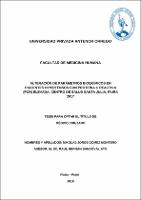Mostrar el registro sencillo del ítem
Alteración de parámetros bioquímicos en pacientes hipertensos con proteína C reactiva (PCR) elevada. Centro de Salud Santa Julia, Piura 2017
| dc.contributor.advisor | Sandoval Ato, Raúl Hernán | |
| dc.contributor.author | Gómez Montero, Nikolas Jorge | |
| dc.creator | Gómez Montero, Nikolas Jorge | |
| dc.date.accessioned | 2018-04-16T18:46:23Z | |
| dc.date.available | 2018-04-16T18:46:23Z | |
| dc.date.issued | 2018 | |
| dc.identifier.uri | https://hdl.handle.net/20.500.12759/4019 | |
| dc.description.abstract | La hipertensión arterial (HTA) es considerada como una enfermedad o condición clínica crónica, comprometiendo principalmente los vasos sanguíneos; ésta a su vez es un factor de riesgo cardiovascular. Se ha demostrado que existen marcadores que pueden verse alterados en ciertas patologías, como es el caso de la proteína C reactiva (PCR), relacionada con la presencia de múltiples patologías crónicas; guardando una relación a determinados factores que influyen en la enfermedad arterial coronaria. Objetivo. Determinar la alteración del parámetro bioquímico de la proteína C reactiva (PCR) en pacientes con hipertensión arterial (HTA). Material y métodos. Estudio transversal, analítico; con un poder estadístico de 97,6% en pacientes del Centro de Salud “Santa Julia”. Se les tomará medidas bioquímicas –por profesionales y con equipos calibrados; además de una encuesta consignando el estilo de vida del paciente. Resultados. La encuesta aplicada a ambos grupos, resalta el no consumo de grasas por por 45 hipertensos y 43 normotensos, el bajo porcentaje de personas que realizan actividad física y que la totalidad de los normotensos refiere no fumar. De los 100 encuestados, el 64,0% fueron del sexo masculino, la mediana de edades fue 53 años. Al realizar el análisis según tener el PCR positivo y elevado, se obtuvo que los que elevaron la frecuencia de tener un PCR positivo fueron el consumir poco/nada de bebidas alcohólicas, el hacer poco/nada de ejercicios y el consumir poco/nada de vegetales; el fumar poco/nada disminuyó la frecuencia de tener un PCR elevado; todas estas ajustadas por la edad de los encuestados y usando como grupo de ajuste el tener hipertensión arterial diagnosticada. Conclusiones. Existe alteración del parámetro bioquímico de la proteína C reactiva (PCR) en pacientes hipertensos; esto se debe a la influencia de algunos estilos de vida, que elevaron la frecuencia de tener un PCR positivo, siendo el consumir poco/nada de bebidas alcohólicas, el hacer poco/nada de ejercicios y el consumir poco/nada de vegetales; el fumar poco/nada disminuyó la frecuencia de tener un PCR elevado. | es_PE |
| dc.description.abstract | High blood pressure (HBP) is considered as a disease or chronic clinical condition, mainly compromising the blood vessels; This, in turn, is a cardiovascular risk factor. It has been shown that there are markers that can be altered in certain pathologies, as is the case of C-reactive protein (CRP), related to the presence of multiple chronic pathologies; keeping a relation to certain factors that influence coronary artery disease. Objective. To determine the alteration of the biochemical parameter of the C reactive protein (CRP) in patients with arterial hypertension (AHT). Material and methods. Cross-sectional, analytical study; with a statistical power of 97.6% in patients of the Health Center ““Santa Julia““. They will be taken biochemical measures - by professionals and with calibrated equipment; in addition to a survey recording the patient's lifestyle. Results. The survey applied to both groups, highlights the non-consumption of fats by both (45 hypertensive, 43 normotensive), the low percentage of people who perform physical activity and that all normotensive refers not smoking. Of the 100 respondents, 64.0% were male, the median age was 53 years. When performing the analysis according to having the positive and elevated PCR, it was obtained that those that increased the frequency of having a positive PCR were consuming little / no alcoholic beverages, doing little / no exercises and consuming little / no vegetables ; smoking little / nothing decreased the frequency of having a high CRP; all adjusted for the age of the respondents and using as an adjustment group having diagnosed hypertension. Conclusions. There is alteration of the biochemical parameter of the C reactive protein (CRP) in hypertensive patients; this is due to the influence of some lifestyles, which increased the frequency of having a positive PCR, being consuming little / no alcoholic beverages, doing little / no exercises and consuming little / no vegetables; smoking little / nothing decreased the frequency of having a high CRP. | en_US |
| dc.description.uri | Tesis | es_PE |
| dc.format | application/pdf | es_PE |
| dc.language.iso | spa | es_PE |
| dc.publisher | Universidad Privada Antenor Orrego - UPAO | es_PE |
| dc.relation.ispartofseries | T_MEDP_056 | |
| dc.rights | info:eu-repo/semantics/openAccess | es_PE |
| dc.source | Universidad Privada Antenor Orrego | es_PE |
| dc.source | Repositorio Institucional - UPAO | es_PE |
| dc.subject | Proteína C reactiva | es_PE |
| dc.subject | Hipertensión arterial | es_PE |
| dc.title | Alteración de parámetros bioquímicos en pacientes hipertensos con proteína C reactiva (PCR) elevada. Centro de Salud Santa Julia, Piura 2017 | es_PE |
| dc.type | info:eu-repo/semantics/bachelorThesis | es_PE |
| thesis.degree.level | Título Profesional | es_PE |
| thesis.degree.grantor | Universidad Privada Antenor Orrego. Facultad de Medicina Humana | es_PE |
| thesis.degree.name | Médico Cirujano | es_PE |
| thesis.degree.discipline | Medicina Humana | es_PE |
Ficheros en el ítem
Este ítem aparece en la(s) siguiente(s) colección(es)
-
Medicina Humana [2739]

